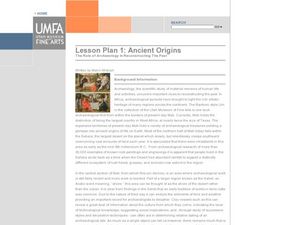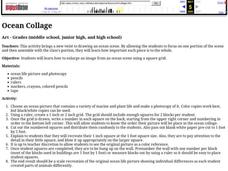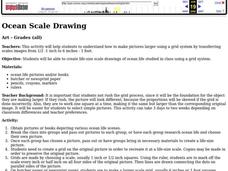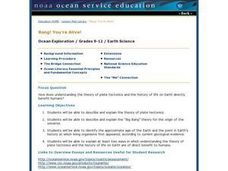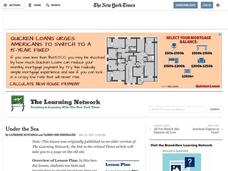American Museum of Natural History
What do You Know About Marine Biology
Show me what you know about the sea. Learners answer 10 questions about marine biology. The questions range from what evidence points to the origin of life to the biggest threat to oceans.
American Museum of Natural History
What do You Know About Life on Earth?
Humans have only inhabited the earth for a fraction of the time that life has existed. Young scientists explore the facts about the emergence of life on Earth with an interactive resource. While highlighting different types of life, the...
University of Waikato
Build a Marine Food Web
Dive into a lesson on marine ecosystem interactions. Individuals learn about and devise a marine food web. The resource provides organism cards and pupils use article resources to discover interactions before modeling them in a food web.
University of Waikato
Ocean Acidification and Eggshells
Eggshells and seashells have a lot in common. Learners use the similarities to conduct an experiment that models the effect of ocean acidification on marine animals. Using varying levels of acidic liquids, pupils make observations on the...
Curated OER
Marine Ecosystems
Learners identify producers and consumers and construct a food chain from four marine ecosystems. They describe the delicate balance among organisms in each environment. In groups, students discuss the human activities that upset the...
MDE k-12
Lesson 5: The Journey Becomes Larger Than Life!
Many muralists throughout history have focused on using their art to represent aspects of their culture or community. After thoroughly researching several muralists, budding artists will create a larger than life mural that contains...
Curated OER
Ocean Expedition with Jacques Cousteau
Students role play that they are on an ocean voyage with Jacques Cousteau as they study plant, and animal species and adaptation. They write a five page journal, create artwork of the expedition.
Curated OER
Ocean Poster
Students discover ocean life by creating a mural. In this ocean biology instructional activity, students utilize a computer to find images of the ocean that can be used to create a collage. Students discuss the different images and how...
Curated OER
Ancient Origins: The Role of Archaeology in Reconstructing the Past
Students read information about the ancient origins of art and archaeology with a focus on the Malian culture. For this art origins lesson, students read background information for the topic and compare ancient and contemporary objects....
Curated OER
Ocean Water and Life
For this ocean water and life worksheet, students match the vocabulary term with the correct definition. Also, students answer questions by deciding if the statements are true or false. Finally, students complete concepts maps while...
Curated OER
The Ocean Floor
Fifth graders discuss the process of sedimentation and the continental drift theory. They locate major structures on the ocean floor and they identify life forms at each level of the ocean.
Alabama Learning Exchange
The Ocean Floor
Learners explore the ocean in this earth science lesson. They use the Internet to gather information on parts of the ocean including the beach, ocean floor, continental shelf, trenches, and the animals that inhabit these parts.
Curated OER
Start at the Very Beginning
Students explore ocean ecosystems. In this cross curriculum art and oceans lesson plan, students create a collage featuring three-finger algae using sand paper, tissue paper, and construction paper.
Rainforest Alliance
Protecting the Critical Habitat of the Manatee and Loggerhead Turtle
Explore ocean habitats with a lesson that showcases the home of manatees and loggerhead turtles in Belize. Here, pupils compare and contrast the homes of ocean animals to those of humans, listen to an original short story about the...
Curated OER
Life of an Island: From Mountain to Atoll
Students research the evolution of a volcanic island from origin to erosion. They determine the relative ages of the Northwestern Hawaiian Islands given their position in the archipelago.
Curated OER
Ocean World
In this online interactive science worksheet, students respond to 7 multiple choice questions regarding icebergs. Students may submit their answers to evaluated.
Curated OER
Beach Combing: Evidence of Life
Students comb the beach and gather remnants of unfamiliar life forms to make speculations about the origins of their discoveries. In this environments awareness lesson, students work in groups to search for evidence of life on the beach....
Curated OER
How Harmful Is It?
Learners complete a form that requires them to make decisions about how severely different types of marine debris affect people, animals, vessels, communities. Results are totaled and analyzed to determine which types of marine debris...
Curated OER
Ocean Collage
Young scholars re-create an image from a marine life scene. They are given a single square of the entire picture to focus on. When all squares are completed, the picture is assembled.
Curated OER
Ocean Scale Drawing
Students explain how to make pictures larger using a grid system by transferring scales images from 1/2 -1 inch to 6 inches - 1 foot. They create life-size scale drawings of ocean life studied in class using a grid system.
Curated OER
Bang! You're Alive
Students explore the Big Bang Theory and the Theory of Plate Tectonics. In this history of life lesson, students explain two ways the Theory of Plate Tectonics and the Big Bang are of direct benefits to humans.
Curated OER
The Deep
In this deep ocean learning exercise, students answer twenty questions after watching a video about the species that live in the deep ocean. Topics include jelly fish, hatchet fish, anglers, tubeworms, sea urchins, and plants that grow...
Curated OER
Fishing for Solutions
Students investigate the many ecological and economic issues related to over fishing the world's marine resources. Working in committees, students research the related topics of equipment and fishing techniques.
Curated OER
Under the Sea
Learners imagine and describe fictitious sea animals that might live in the ocean. After reading an article, they reflect on new discoveries found in the ocean recently. Using the internet, they research the interdependence of animals...










